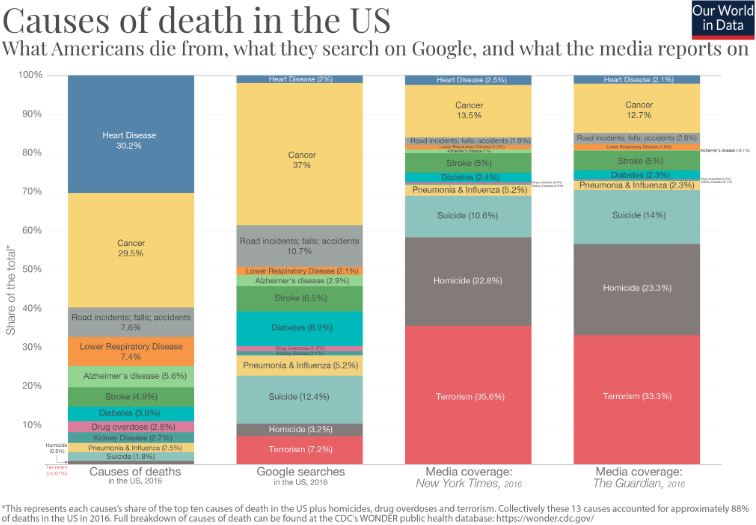Does to the fast-paced reporting we see in the news compare at all with the things we search for online?
Does to the fast-paced reporting we see in the news compare at all with the things we search for online? And does that have anything to do with the things people are actually dying from?
Our World In Data turned to this interesting question and found a considerable disconnect between what we die from, how much coverage these causes get in the media, and what we actually Google.
Americans search on Google is a much closer reflection of what kills us than what is presented in the media.
Findings showed:
- [ihc-hide-content ihc_mb_type=”show” ihc_mb_who=”3,4,5,6″ ihc_mb_template=”3″ ]
- One-third of the considered causes of deaths resulted from heart disease (hence it should be something that concerns us), yet this cause of death receives only 2-3 percent of Google searches and media coverage.
- Just under one-third of the deaths came from cancer; and although cancer represents 37% of Google searches, it receives only 13-14 percent of media coverage.
- Road incidents are searched more more frequently than their share of deaths, however, they receive even less attention in the news.
- When it comes to deaths from strokes, Google searches and media coverage are surprisingly balanced.
- The largest discrepancies concern violent forms of death: suicide, homicide and terrorism. All three receive much more relative attention in Google searches and media coverage than their relative share of deaths.
- The relative ranking of deaths in the U.S. is reflective of the global average: most people die from heart disease and cancers; terrorism ranks last or second last (alongside natural disasters).


The first column represents each cause’s share of US deaths; the second the share of Google searches each receives; third, the relative article mentions in the New York Times; and finally article mentions in The Guardian. The authors calculated this data annually from 1999 to 2016 (due to data availability, from 2004 onwards for Google Trends). The news doesn’t reflect what we die from
According to the data presented by Our World In Data, homicides are very overrepresented in the news. The most underrepresented in the media are kidney disease, heart disease, and, perhaps surprisingly, drug overdoses. Stroke and diabetes are the two causes most accurately represented.
These fast-paced times has media and its consumers stuck in a reinforcing cycle of expectation that leverages a negative perception of the world. As news consumers, our expectations to receive information has quickly shifted to a minute-by-minute standard, turning reporting into a high-paced work. If this is combined with our attraction to stories and narratives, it’s not surprising that the media focuses on reports of single (inadvertently negative) events such as a terrorist attack that makes us feel the world is much worse than it is.
As we will never stop reporting and reading the latest news, we need to be aware of the fact that relying on the 24/7 news coverage alone is wholly insufficient for understanding the state of the world. How we let the news shape our understanding of the world is crucial.
[/ihc-hide-content]












